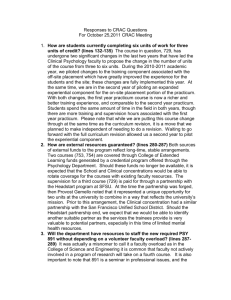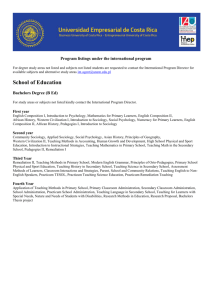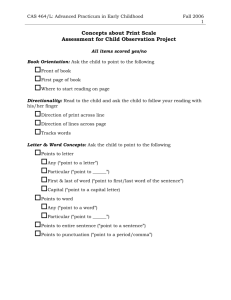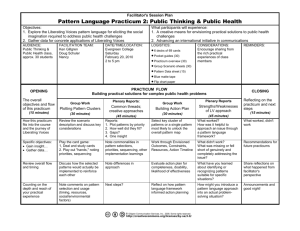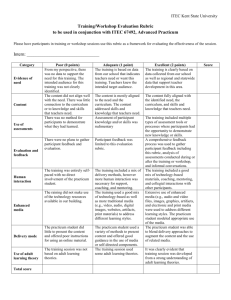Psychology 873 Community Research and Action Practicum Spring
advertisement
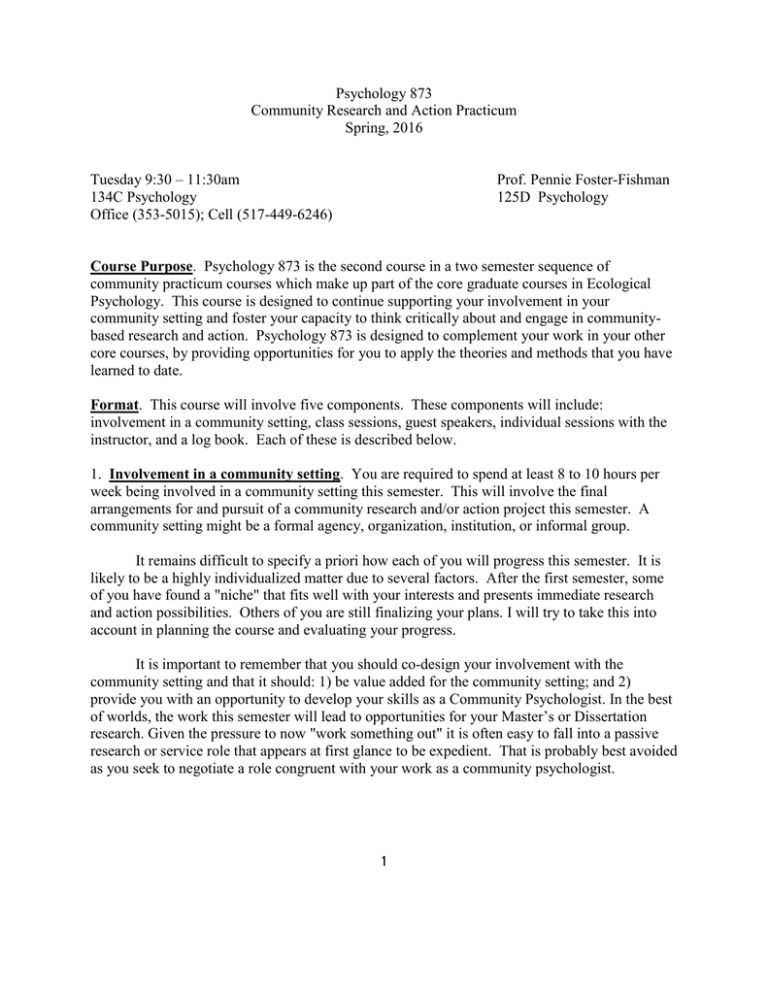
Psychology 873 Community Research and Action Practicum Spring, 2016 Tuesday 9:30 – 11:30am 134C Psychology Office (353-5015); Cell (517-449-6246) Prof. Pennie Foster-Fishman 125D Psychology Course Purpose. Psychology 873 is the second course in a two semester sequence of community practicum courses which make up part of the core graduate courses in Ecological Psychology. This course is designed to continue supporting your involvement in your community setting and foster your capacity to think critically about and engage in communitybased research and action. Psychology 873 is designed to complement your work in your other core courses, by providing opportunities for you to apply the theories and methods that you have learned to date. Format. This course will involve five components. These components will include: involvement in a community setting, class sessions, guest speakers, individual sessions with the instructor, and a log book. Each of these is described below. 1. Involvement in a community setting. You are required to spend at least 8 to 10 hours per week being involved in a community setting this semester. This will involve the final arrangements for and pursuit of a community research and/or action project this semester. A community setting might be a formal agency, organization, institution, or informal group. It remains difficult to specify a priori how each of you will progress this semester. It is likely to be a highly individualized matter due to several factors. After the first semester, some of you have found a "niche" that fits well with your interests and presents immediate research and action possibilities. Others of you are still finalizing your plans. I will try to take this into account in planning the course and evaluating your progress. It is important to remember that you should co-design your involvement with the community setting and that it should: 1) be value added for the community setting; and 2) provide you with an opportunity to develop your skills as a Community Psychologist. In the best of worlds, the work this semester will lead to opportunities for your Master’s or Dissertation research. Given the pressure to now "work something out" it is often easy to fall into a passive research or service role that appears at first glance to be expedient. That is probably best avoided as you seek to negotiate a role congruent with your work as a community psychologist. 1 2. Class sessions. The class sessions are organized to promote reflection around your community work and the integration of theory and methods into your practicum. During each class session there are a few assigned readings, some initial questions to promote reflection and discussion, and suggestions for Session Leaders. See the course schedule below for the specific content and assignments for these sessions. Overall, sessions will be focused on several objectives: Supervision and support of your community involvement. During each of these sessions, you will be asked to discuss your work in the community, share a description of your work with classmates, and problem solve next steps. As much as possible, we will work to design this part of our class as a peer-to-peer learning environment. To support that goal, you will be expected to give feedback to your peers on their work and provide any written materials to the class two days prior to our class time so we will all have a chance to provide you with feedback. Linking Action, Theory, and Research. Effective community psychologists engage in praxis, reflecting on their work in the community and using the best ideas, theories, and practices that can be found in the literature to inform their work. To help you develop these skills, we will be reading and applying some key articles to your work in the community. Be prepared to discuss the assigned readings and questions and their potential application to your practicum. In addition, at various points throughout the semester, I will provide you with opportunities to highlight/apply theory articles you read last semester. Class Session Leader Assignments. Each of you is expected to lead the class sessions. Session leaders are responsible for creating useful summaries of the assigned articles and helping the class link ideas to other readings from either this class or other classes. Session leaders are also responsible for facilitating the discussion around the key articles assigned during their work and/or developing in class activities to practice applying the key concepts. Assignments for the summaries are listed on the below course schedule. We will continue to follow the session leader rotation from the first semester. 3. Guest Speakers – One week during the semester we will have some phone interviews with recent Community Psychology graduates. We will schedule two to three graduates for this session. The class can select from the attached list potential speakers of interest. We will ask each of them to share with us their “professional story” for 10-15 minutes. The class will then be given the opportunity to ask questions of them for the remainder of the allotted time (30 minutes each). 4. Individual sessions. Four weeks during the semester we will schedule individual sessions with the instructor. This should allow more intense discussion of each of your community experiences. These will occur during class time according to the schedule below. You are also welcome to contact me for additional individual sessions if needed. 2 5. Community log books. As was the case last semester, your practicum log book will detail your community research and action work. It will be used in part to determine your grade for the practicum component of the course. You should pay close attention to your notes, and at least one entry each week should carefully describe your activities. This might include such items as notes about organizations, contact people, phone numbers, results of contacts, future plans, etc. Your log book should be organized in the following manner and provide the details for each session. Section 1: Weekly Activities. Provide a detailed description of your activities in the last week, including their purpose and actions taken. Provide specifics on the work you did, how you participated in your organization, the role(s) you took on, who you met with, meetings you participated in. Include any organizations contacted, contact people, phone numbers, results of contacts, including what you have learned. This section should be an account of the events which happened during the week in your practicum. Section 2: Subjective report. What were your impressions of what happened this week? To what extent is the setting meeting your needs and goals? To what extent are you meeting the settings objectives? How is your community work proceeding? What changes needs to be made to your plans? I also expect you to use this section to talk about the application of the readings to your practicum experience. You can use this time to respond to the praxis questions I have provided and/or identify other issues you want to discuss. Section 3: Future plans. What are your plans for the next week? What do you plan to do? With whom? When? Is this leading where you want it to? Is it likely to match with your research needs? Given what you read this week, how might you apply these ideas next week in your practicum? Section 4: Troubleshooting. What problems/obstacles/frustrations did you encounter this week? Do you have plans for resolution? Do you need my assistance? Your log books are due to me and your classmates via email attachment by noon on Monday of each week. 3 Grading Scheme. Grades will be determined in the following manner. 1. Log book (14 sessions @ 4 points) 56 points 2. Class participation including session leadership (10 Sessions @ 8 pts.) 80 points 3. Instructor evaluation* of practicum (14 sessions @ 10 points) 140 points 276 points Grading: 4.0 248 points or higher 3.5 235 points or higher 3.0 221 points or higher 2.0 <220 points *Note: This component of the grade will be my evaluation of your community field work. It will involve an assessment of your effort in the field work, your planfulness, your perseverance, and your class participation. It will also include attention to your efforts to integrate theory into your thinking and practice within your practicum. Grades will be given on a weekly basis and averaged over the quarter. I will give you feedback on your progress in this area during our individual sessions. 4 CLASS SCHEDULE Date Wk Class Topic 1/12/ 1 Class Organization & Updates on Community Work 1/19/ 2 Class Session: University/ Community Collaboration Assignments Yolanda Suarez-Balcazar, Gary W. Harper and Rhonda Lewis. An interactive and contextual model of community-university collaborations for research and action. Health Education Behavior 2005; 32; 84 – 101. Harper, G.W., Bangi, A.K., Contreras, R., Pedraza, A., Tolliver, M., & Vess, L. (2004). Diverse phases of collaboration: working together to improve community based HIV interventions for adolescents. American Journal of Community Psychology, 33 (3/4), 193-204 Langhout, R.G., & Dworski-Riggs, D. (2010). Elucidating the Power in empowerment and the participation in participatory action research: A story about research team and elementary school change. American Journal of Community Psychology, 45, 215-230. Session Leader: Discussion topics 5 What do these articles offer that could explain some of your practicum experiences last semester? What do these articles say about how to create an effective relationship with your practicum site? What might be some of the power boundaries you face in your setting/social issue domain? Which processes and skills do you think you will be good at? Which ones could you develop more? Session Leader: Create a checklist that you and your peers can use to guide your collaborative work in the community. 1/26 3 Individual Sessions 2/2 4 Class Session: Power and Oppression To be Scheduled Hartmann, W.E., Wende, D.C., Saftner, M.A., Marcus, J, & Momper, S.L. (2014). Advancing community based research with urban American Indian populations. American Journal of Community Psychology, 54(1), 72-80. Watson, E., & Foster-Fishman, P.G. (2012). The exchange boundary framework: Understanding the evolution of power within collaborative decision-making settings. American Journal of Community Psychology; online, July, 2012. Prilleltensky, I. (2003). Understanding, Resisting, and Overcoming Oppression: Toward Psychopolitical Validity American Journal of Community Psychology, Vol. 31, Nos. 1/2, March 2003 ( C° 2003) Lykes, M.B., & Moane, G. (2009). Editors' Introduction: Whither Feminist Liberation Psychology? Critical Explorations of Feminist and Liberation Psychologies for a Globalizing World. Feminism Psychology 2009; 19; 283 Session Leader: Discussion topics 6 Which approach to power most fits with your assumptions? Why? Which approach to power best fits with your social issue or your practicum site? How might your practicum site or the approach to your social issue change if a different approach to power was adopted? How might these power frameworks help you understand your social issue and the process of social change? Pick one of the above articles and think about: 1) a research question you could ask in your practicum site using this framework; 2) three variables that you would measure using this framework. 2/9 5 Class Session: Theories for Community Action & Research 2/16 6 Guest speakers 2/23 7 Individual Sessions. 3/1 8 Class Session: Promoting Utilization Foster-Fishman, P.G. & Watson, E.R. (2012). The ABLe change framework: A conceptual and methodological tool for promoting social change. American Journal of Community Psychology, 49, 503-516. Nelson, G. (2013). Community psychology and transformative policy change in the neo-liberal era. American Journal of Community Psychology, 52(3/4), 211-223. Theory at a Glance: A Guide For Health Promotion Practice (Second Edition). U.S. Department Of Health And Human Services National Institutes of Health. Session Leader: Discussion topics What theories included in these readings do you find the staff/volunteers/clients at your practicum site using to explain either organizational or client behavior? Which theories might be helpful for your practicum site (for either your work or the setting members)? Why? Be prepared to describe in class how you could integrate one of these theories into your practicum. For example, what intervention would you do, what research question might you include, etc? To be Scheduled Fagan, A. A. Hanson, K., Briney, J.S. & Hawkins, J.D. (2012) Sustaining the utilization and high quality implementation of tested and effective prevention programs using the Communities that Care Prevention system. American Journal of Community Psychology, 49 (3-4), 365-377 Miller, R.L., & Shinn, M. (2005). Learning from communities: Overcoming difficulties in dissemination of prevention and promotion efforts. American Journal of Community Psychology, 35(3/4), 169-183. 7 Durlak, J.A., & DuPres, E. P. (2008). Implementation Matters: A Review of Research on the Influence of Implementation on Program Outcomes and the Factors Affecting Implementation. American Journal of Community Psychology, 41, 327-350. http://www.nrepp.samhsa.gov/find.asp Session Leader: Discussion Topics Using ideas from the Miller/Shinn article and Durlak & Dupre’s article, assess the capacities of your practicum to implement an evidence based practice. What challenges might your site experience in trying to implement one of these programs or your practicum project? What challenges might you experience as you try to implement your practicum? Session Leader. Create a checklist for you and your peers that includes recommendations for promoting the adoption and implementation of programs within community settings (using Miller & Shinn’s and Durlak & Dupre’s article). 3/15 9 Individual Sessions 3/22 10 Appreciative Inquiry & Utilization Ludema, J.D., Cooperrider, D.L., & Barrett, F.J. (2001). Appreciative inquiry: the power of the unconditional positive question. In P. Reason & H. Bradbury (Eds). Handbook of action research: Participative inquiry and practice. (pp. 190-199). London: Sage. Patton, M.W. (2002). Utilization-focused evaluation (u-fe) checklist www.wmich.edu/evalctr/checklists Practicing Praxis According to the material you read for class this week, what have you done in your practicum that will help to promote the utilization of your work/findings? What have you done that might hinder utilization? What else can you do moving forward to promote utilization? Complete Patton’s checklist for yourself and your practicum. What does this checklist tell you? 8 To what extent have you used the unconditional positive question in your interactions with your site? How might this approach shift your relationship and work in your practicum setting? Session Leader. Create a top 10 list of things a community psychologist can do to promote the utilization of findings within community sites. - Jamie 3/29 11 Class Session Community Collaboration for Change 4/5 12 4/12 13 Watson-Thompson, J., Fawcett, S. B., & Schultz, J. A. (2008). Differential effects of strategic planning on community change in two urban neighborhood coalitions. American Journal of Community Psychology, 42, 25-38. Felix, M.R.J., Burdine, J.N., Wendel, M.L., & Alaniz, A. (2010). Community health development: A strategy for reinventing America’s health care system one community at a time. Journal of Primary Prevention, 31, 9-19. Session Leader: Discussion Topics How does your site engage in planning? Does it plan with community partners or on its own? What recommendations emerge from this article around how to improve your sites’ planning processes or your planning for your practicum? What principles from the community health development article apply to your practicum site? Is your community following “best practice” in regards to promoting overall community health? What else should be done? Individual sessions Class Session Bales, S.N., & Gilliam, F.D. (2009). Lessons from the story of early child development: Domain decisions and framing youth development. New Directions for Youth T Development, 124, 119-134. Manuel, T.h(2009). Who says your frames are better than mine? Making the case for strategic framing by using the power of experimental research. New Directions for Youth e Development, 124, 71-82. P O,Neil, M.(2009). The family bubble, achievement gap, and development as competition: o Media w frames on youth. New Directions for Youth Development, 124, 39-49. Session Leader: e Discussion Topics 9 4/19 14 Class Session r frames dominate stakeholder perceptions of your targeted social problem? How Which o those frames impede successful social change? might f F r a m i n g Stolley, K., (2009) Avoiding plagiarism. OWL at Purdue. Owl. English.purdue.edu/owl/resource/589/01/ The Writing Plagarism Center, (2009 Capacity Building Bond, L., Glover, S., Godfrey, C., Butler, H., Patton, G.C. (2001). Building capacity for systems-level change in schools: Lessons from the Gatehouse Project, Health Education & Behavior, 28(3), 368-383. Griffith, D.M., Ober Allen, J., et al., (2010). Community-based organizational capacity building as a strategy to reduce racial health disparities. Journal of Primary Prevention, 31, 31-39. 4/26 15 Class Session Understanding Help -Seeking Behaviors Practicing Praxis Does your practicum site have the capacity for systems-level change? Does it have the capacity to effectively participate with other community partners? Why or why not? How could you build your site’s capacity for system-level change? How would capacity building in your site need to differ from that described in the articles? Liang, B., Goodman, L., Tummala-Narra, P., & Weintraub, S. (2005). A theoretical framework for understanding help-seeking processes among survivors of intimate partner violence. American Journal of Community Psychology 36(1/2), 71-84. Practicing Praxis 10 5/3 16 Individual Feedback Sessions 11 To what extent do the processes of defining the problem, deciding to seek help, and selecting a source of support explain the access to services processes for your target population? What individual, interpersonal, and sociocultural factors might influence that decision-making for your target population? Potential Psychology 873 Speakers Graduate Position Marisa Beeble Assistant Professor, The Sage Colleges, Albany, N.Y. Giannina Cabral Research Associate, Harder & Co, Community Research, Los Angeles Charles Collins Assistant Professor, Department of Psychology, University of Washington-Boethl Christina Campbell Assistant Professor, Southern Illinois University/Psychology/C.J. Dan Cantillon Director of Research and Evaluation at Cure Violence, Chicago Meegan Greeson Assistant Professor, DePaul University/Psychology Pat Janulus Post Doctoral Fellow, Epidemiology, Northwestern University Jennifer Mortensen Specialist, YMCA of USA (Chicago), Program Evaluation Aisha Nyandoro Independent Consultant, Jacksonville, Mississippi Eitayo Onifade Assistant Professor, Florida State University, Social Work Jodi Petersen Senior researcher, Community Research Institute: Johnson Center for Philanthropy Grand Valley State University Jessica Shaw Postdoctoral Fellow, NIJ Angela Wolf Associate Director of Research, National Council of Crime and Delinquency Evelyn Yang Senior Associate, Community Science, Gaithersburg, MD 12
